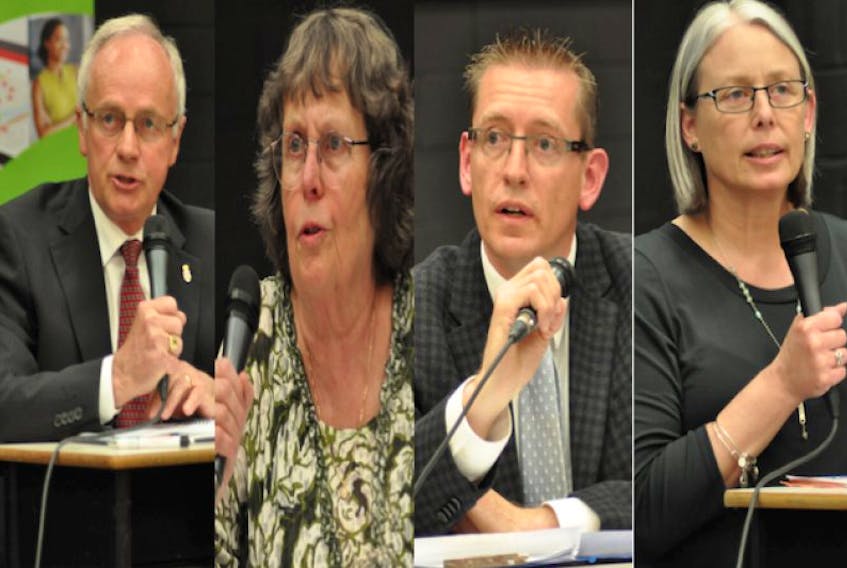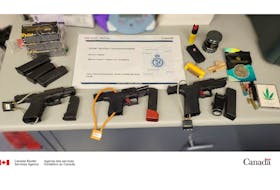More than 80 people attended the Kings West Candidates’ Forum hosted at West Kings District High School. The Annapolis Valley Chamber of Commerce, NS Realtors' Association and kingscountynews.ca teamed up to co-host the event.
NDP candidate Cheryl Burbidge, Liberal incumbent Leo Glavine, PC contender Chris Palmer and Green party representative Madeline Taylor covered a number of topics, including support for first-time home buyers, economic development, rural internet, poverty, transportation, the film tax credit, doctor shortages, education and rural transportation.
The election is set for May 30. Click on the name of the Kings West candidate to read profiles for Cheryl Burbidge, Leo
Here’s what the Kings West MLA hopefuls had to say about long-term care funding, roads, education and food insecurity:
1. There have been cuts to funding to services in our senior care homes. There are large numbers of seniors in our province and many will end up in long-term care… there are staff shortages in these homes, which will result in seniors not receiving the level of care they deserve. What will your government do to address these issues and provide the best care possible for seniors in long-term care?
Leo Glavine:
Glavine started by saying the Liberals worked with administrators in the province’s nursing homes to look at how better business planning would result in savings.
“Staffing, if it was affected, then it certainly was not part… of any plan, nor should it have occurred… the same way in terms of other levels of services,” he said, adding that homes that were previously struggling are now buying in bulk, issuing tenders to reduce costs and working with other homes for procurement purposes.
“It depends very much on the individual home as to what is taking place,” he said, noting that the Liberals would add $3.2 million in the budget this year to improve food and recreation services in nursing homes.
Cheryl Burbidge:
“The NDP’s platform does include to refund the $8 million that was cut in nursing homes and residential care facilities. In this area, there was $200,000 cut out of the budget of Grand View Manor. The residents there just received… a letter from the manor itself saying they will no longer fund things like their vitamin B or their Tylenol… they have to purchase that now themselves,” said Burbidge.
“The people that I’ve talked to at the door… have noticed a decline in the quality of food… those are issues that are real, that are out there, that do need to be addressed.”
Madeline Taylor:
“If you don’t have enough people, you can’t do a good job – and you can’t care for your people,” she said, referring to staffing levels at long-term care facilities.
“It doesn’t seem quite right that we skimp on the people that we love and that are the elderly population. I’m 74 and I don’t know what’s next, so let’s get this straightened out,” she said.
Chris Palmer:
“One of the things that we’re going to do as a party is we’re going to put (into) law a seniors’ bill of rights that will commit to having seniors… if there’s a man and a wife, couple… this will ensure that they can be in the same location and not have to be spread 100 miles so it tears the family apart. We’re going to ensure that won’t happen,” said Palmer.
“We’re going to reverse the cuts… we’re going to put money back into… the homes so they can get the food budgets up… I think our seniors deserve more. They have done so much for us.”
2. When are our roads going to be drivable again?
Madeline Taylor:
“Something has to happen. It’s hard on cars. I broke a wheel a few years ago… it’s costly to people,” she said, adding that she often hears concerns about the conditions of the roads and she believes cooperation from all levels of government is needed.
Chris Palmer:
“We need to have good roads and infrastructure. It connects us all. It connects our economy. We have to connect businesses to consumers. We have to connect families… and make things safe,” he said, stressing that he believes investments in roads are
Palmer concluded by vowing to push for Kings West’s roads to be viewed as priorities when provincial funding is distributed.
Leo Glavine:
“I’ve never been more optimistic… I have lived with, as the MLA for Kings West, an out-of-the-area area manager for my entire time in office… We finally have an area manager who lives in Kings County. He’s invested here in every way and I now have, on my desk, a five-year plan for paving, five-year plan for double chip seal and a plan to improve the gravel roads. This has never happened before and… if I’m back in
Cheryl Burbidge:
“One of the things that the NDP did do when we were in government was we bought a mobile asphalt and chip seal machinery… it gave the government an idea of what those things really did cost and it gave the opportunity to go into those small little areas that the big businesses were not interested in doing. When the Liberals took office they sold that equipment to Newfoundland and then the cost of chip sealing jumped 20 per cent, so one of the things that we are looking at is we are going to, if we were able to go into office again… continue with the plan that was in the budget that came out a couple weeks ago… the twinning of the 101 (from) Falmouth to the other side of Windsor and we do not believe in toll highways.”
3. How do you plan to address the concerns of educators raised during work-to-rule this past winter?
Cheryl Burbidge:
“One of the first things the NDP want to do is repeal Bill 75,” she said, adding that “the flavor of bargaining” has changed in the province.
The public now knows more about the issues teachers face in the classroom on a daily basis, said Burbidge.
“There is a lot of issues. I have four children… two of my grandchildren are in school here in the Valley and I would hope that they will have a good basis to be able to be educated from.”
Madeline Taylor:
“I don’t know how it could have been done better. I’ve certainly been a person that has been out on strike myself… I sympathize with the teachers… and they probably had some good reasons for what they were doing and I don’t know if things were negotiated in good faith or not. I’d have to know more.”
Chris Palmer:
“I think what happened by imposing the contract, it set our province down a course that could cost us more in the long run. There’s cases across Canada where governments have lost cases – court challenges – and, unfortunately, this government won’t be in power when that happens. Another government will have to pay for that.”
Leo Glavine:
“I believe in the past year or two that we reached that tipping point where the classroom conditions overwhelmed everything in education. This has been a decline in public
4. Considering that both the cost of food and food bank usage in Nova Scotia are on the rise, how would you address food insecurity and hunger in Nova Scotia?
Madeline Taylor:
“The Green party believes in what we call a guaranteed annual income and that (means) that people would make a certain amount of money that would be up above the poverty level,” she said, noting that in her role as a social worker she often sees the “chaos” that is a direct result of people living in poverty.
Chris Palmer:
“I do a lot of work every Christmas for the food banks. I put Christmas concerts on every year and we’ve been able to raise quite a lot of money for the local food banks in Berwick and Kingston. I think, individually, we can all do what we need to do… to help food banks.”
“Government should be there when people need it the most, so one of the things we want to do is raise the basic personal amount of income by up to $3,000 for people with incomes below $75,000. That one move will cut taxes for over 500,000 Nova Scotians.”
Leo Glavine:
Glavine noted that the Liberal budget also contains a commitment to changing the basic personal exemption.
“This would allow up to 500,000 Nova Scotians to benefit from that raising from $8,441 to $11,481 before you would start to pay taxes and… this is more money in Nova Scotians’ pockets,” he said, listing the introduction of a standard household rate for income assistance, more assistance for people who are unable to work as well as incentives for those who are able to get back to work, and a new tax credit for farmers who donate excess or misshapen products to food banks as additional ways to help low-income Nova Scotians.
Cheryl Burbidge:
“We want to try to set the social assistance rates so that people can afford to shop at a grocery store instead of having to go to a food bank. We were looking at raising the minimum wage… (to) put more money in people’s pockets… and look at a designed phase of a basic income guarantee so people that are working and at low-income jobs do have a chance to have a little bit more so they can afford to buy their own food,” she said, later adding that it is important to look at new ways to support farmers struggling to make ends meet.
“It truly amazes me that we’ll pay somebody $1 million to play hockey, but our farmers struggle to make ends meet.”









